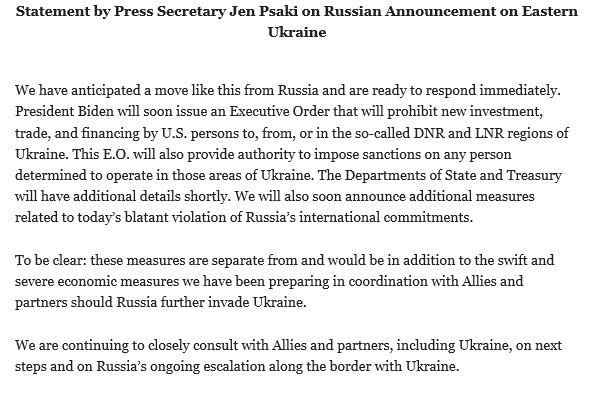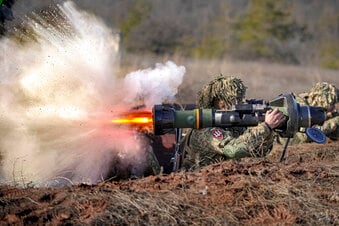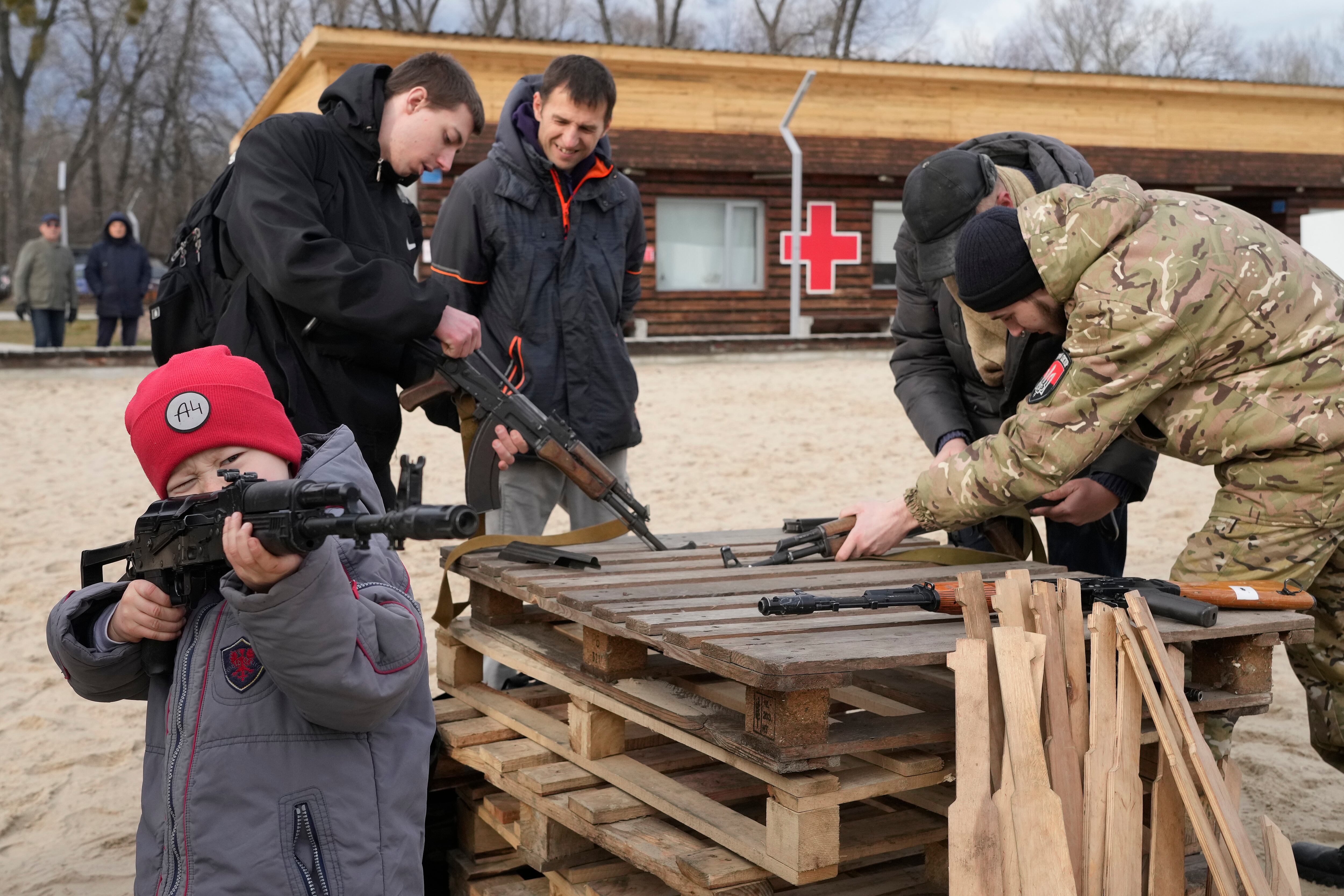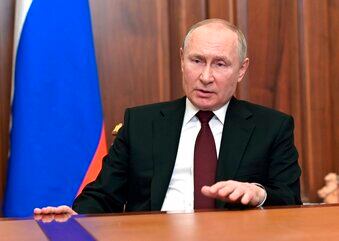Russian President President Vladimir Putin has recognized the independence of separatist regions in eastern Ukraine — a move that will severely ratchet up tensions with the West amid fears that his country could invade Ukraine at any moment and use skirmishes as a pretext for an attack.
Putin’s announcement comes after a meeting of the presidential Security Council and paves the way for Russia to openly send troops and weapons to the long-running conflict pitting Ukrainian forces against Moscow-backed rebels. A 2015 peace deal ended large-scale fighting, but violence has simmered and has seen a spike in recent weeks amid the wider crisis.
Shorly after Putin’s decree, the White House announced President Joe Biden would issue an executive order preventing U.S. trade with the separatist regions and sanctions on any individuals doing business there.
“We have anticipated a move like this from Russia and are ready to respond immediately,” said White House spokeswoman Jen Psaki. “President Biden will soon issue an Executive Order that will prohibit new investment, trade, and financing by U.S. persons to, from, or in the so-called DNR and LNR regions of Ukraine.”
The order, she said, “will also provide authority to impose sanctions on any person determined to operate in those areas of Ukraine. To be clear: these measures are separate from and would be in addition to the swift and severe economic measures we have been preparing in coordination with Allies and partners should Russia further invade Ukraine. "

Biden spoke with Ukraine Volodymyr President Zelensky following Putin’s speech, according to the White House pool report. The call lasted roughly 35 minutes,
At the carefully orchestrated, pre-recorded meeting of the Putin’s presidential Security Council earlier Monday, a stream of top Russian officials argued for recognizing the separatist regions’ independence, though some suggested Putin didn’t have to do it immediately. It came amid a spike in skirmishes in those regions that Western powers believe Russia could use as a pretext for an attack on the western-looking democracy that has defied Moscow’s attempts to pull it back into its orbit.

With an estimated 150,000 Russian troops massed on three sides of Ukraine, the U.S. has warned that Moscow has already decided to invade. Still, the American and Russian presidents tentatively agreed to a possible meeting in a last-ditch effort to avoid war.
If Russia moves in, the meeting will be off, but the prospect of a face-to-face summit resuscitated hopes that diplomacy could prevent a devastating conflict, which would result in massive casualties and huge economic damage across Europe, which is heavily dependent on Russian energy.
Even as the diplomatic efforts inched forward, potential flashpoints multiplied. Sustained shelling continued Monday in Ukraine’s east. Unusually, Russia said it had fended off an “incursion” from Ukraine — which Ukrainian officials denied. And Russia decided to prolong military drills in Belarus, which could offer a staging ground for an attack on the Ukrainian capital, Kyiv.
Moscow could use the move to openly send its troops and weapons there. Until now, Ukraine and the West have accused Russia of supporting the separatists, but Moscow has denied that, saying that Russians who fought there were volunteers.
As Putin spoke, President Joe Biden met with his national security team at the White House and is being regularly briefed on developments regarding Russia and Ukraine, according to the White House press pool.
NATO Secretary General Jens Stoltenberg immediately denounced Putin’s decision.
“I condemn Russia’s decision to extend recognition to the self-proclaimed ‘Donetsk People’s Republic’ and ‘Luhansk People’s Republic,’” he said in a statement. “This further undermines Ukraine’s sovereignty and territorial integrity, erodes efforts towards a resolution of the conflict, and violates the Minsk Agreements, to which Russia is a party.
“Moscow continues to fuel the conflict in eastern Ukraine by providing financial and military support to the separatists,” he said. “It is also trying to stage a pretext to invade Ukraine once again.”
The European Union’s top officials say the bloc will impose sanctions against those involved in Russia’s recognition of two separatist regions of eastern Ukraine amid fears of a potential Russian invasion of the country.
EU Commission President Ursula von der Leyen and Council President Charles Michel say in a joint statement that the recognition is “a blatant violation of international law.” The statement adds that the bloc “will react with sanctions” and “reiterates its unwavering support to Ukraine’s independence, sovereignty and territorial integrity within its internationally recognised borders.”
At Monday’s meeting, Putin’s top defense and security officials paraded before him one by one to outline arguments for recognizing the regions as independent to protect civilians there. At one point, one slipped up and said he favored including them as part of Russian territory — but Putin quickly corrected him.
Earlier Monday, leaders of the regions released televised statements pleading with Putin to recognize them and sign treaties that would allow for military aid to protect them from what they described as an ongoing Ukrainian military offensive. Russia’s lower house of parliament made the same plea last week.
Ukrainian authorities deny launching an offensive and accuse Russia of provocation.
Russia similarly recognized two breakaway regions of the former Soviet republic of Georgia in 2008 after a brief war, and expanded its military presence in both South Ossetia and Abkhazia on the Black Sea.
But the Kremlin initially signaled its reluctance to recognize the regions in eastern Ukraine, arguing that would effectively shatter the peace deal, which marked a major diplomatic coup for Moscow, requiring Ukrainian authorities to offer a broad self-rule to the rebel regions.
The deal was resented by many in Ukraine who saw it as a capitulation, a blow to the country’s integrity and a betrayal of national interests. Putin and other officials argued Monday that Ukrainian authorities have shown no appetite for implementing it.
Ukraine and the separatist rebels have traded blame for massive cease-fire violations with hundreds of explosions recorded daily.
While Russia-backed separatists have charged that Ukrainian forces were firing on residential areas, Associated Press journalists reporting from several towns and villages in Ukrainian-held territory along the line of contact have not witnessed any notable escalation from the Ukrainian side and have documented signs of intensified shelling by the separatists that destroyed homes and ripped up roads.
Some residents of the main rebel-held city of Donetsk described sporadic shelling by Ukrainian forces, but they added that it wasn’t on the same scale as earlier in the conflict.

The separatist authorities said Monday that at least four civilians were killed by Ukrainian shelling over the past 24 hours and several others were wounded. Ukraine’s military said two Ukrainian soldiers were killed over the weekend, and another serviceman was wounded Monday.
Ukrainian military spokesman Pavlo Kovalchyuk said the separatists were “cynically firing from residential areas using civilians as shields.” He insisted that Ukrainian forces weren’t returning fire.
In the village of Novognativka on the Ukraine government-controlled side, 60-year-old Ekaterina Evseeva, said the shelling was worse than at the height of fighting early in the conflict.
“We are on the edge of nervous breakdowns. And there is nowhere to run,” she said, her voice trembling.
In another worrying sign, the Russian military said it killed five suspected “saboteurs” who crossed from Ukraine into Russia’s Rostov region and also destroyed two armored vehicles. Ukrainian Border Guard spokesman Andriy Demchenko dismissed the claim as “disinformation.”
Amid the heightened invasion fears, the U.S. administration sent a letter to the United Nations human rights chief claiming that Moscow has compiled a list of Ukrainians to be killed or sent to detention camps after the invasion. The letter, first reported by the New York Times, was obtained by the AP.
Kremlin spokesman Dmitry Peskov said the claim was a lie and no such list exists.
Meanwhile, the European Union’s top diplomat, foreign policy chief Josep Borrell, said the 27-nation bloc has finalized its package of sanctions for use if Putin orders an invasion.
Karmanau reported from Kyiv, Ukraine, and Cook from Brussels. Lori Hinnant in Kyiv; Angela Charlton in Paris; Zeke Miller and Aamer Madhani in Munich, Germany; Geir Moulson in Berlin; and Ellen Knickmeyer, Robert Burns, Matthew Lee and Darlene Superville in Washington contributed to this report.
This is a developing story. Stay with MilitaryTimes.com for updates.
Howard Altman is an award-winning editor and reporter who was previously the military reporter for the Tampa Bay Times and before that the Tampa Tribune, where he covered USCENTCOM, USSOCOM and SOF writ large among many other topics.




